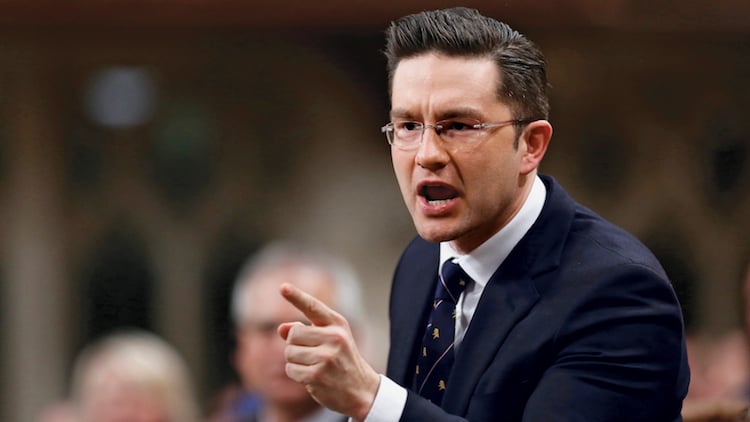How often are voter information cards being abused?
Various worries, but only two confirmed cases
Canada’s Minister of State for Democratic Reform Pierre Poilievre speaks during Question Period in the House of Commons on Parliament Hill in Ottawa December 3, 2013. REUTERS/Chris Wattie (CANADA – Tags: POLITICS) – RTX162IW
Share

Attempting to defend Brad Butt’s having not actually seen what he said he actually saw, Peter Van Loan offered this explanation to the House on Tuesday.
I personally have heard anecdotes from others, not having witnessed it myself. It is different from having heard an anecdote, but having heard it quite regularly, it becomes part of the normal discourse that “this is what happens out there”. This is what everybody “knows” happens out there. It is a risk and a concern that has to be addressed, and one of the reasons why I think it is being addressed in this legislation.
Worries about the abuse of the voter information card are not new. Here is a Bloc MP telling the House in 2001 that, “Some people were literally going to every apartment building picking up those cards. I have seen some people with 300 to 400 cards in their possession.” Here is Conservative MP Laurie Hawn alleging in 2006 that someone in his riding had voted for his opponent 14 times. Here is the national director of the Liberal party venturing in 2006 that “the misuse of voter information cards is quite simply out of control.” (You can review all references in the House and at committee hearings to “voter information card” and “voter identification card” here and here.) (Mr. Hawn has also reported a narrowly averted case of improper vouching.)
The Fair Elections Act would eliminate vouching as an option and prevent voter information cards from being used as identification.
A voter information card is not supposed to be enough to identify someone at a polling station, but it has been tested as a piece of identification when used with a second piece of identification. And in his report on election procedures, Harry Neufeld recommended widening the use of the voter information card to reduce the need for vouching (page 38), while chief electoral officer Marc Mayrand responded that “For 2015, we plan to revise our voter identification policy to permit the Voter Information Card (VIC) to be used as proof of address for all electors when it is accompanied by another approved piece of identification. We will also look at simplifying the list of acceptable pieces of identification. These measures should improve access, simplify the process for electors and election workers and reduce the requirement for vouching.” (Mr. Neufeld also believes that vouching should remain an option.)
On Tuesday, Thomas Mulcair wondered, in regards to what Brad Butt now says he’s heard about, what evidence there was of voter fraud involving voter information cards. After the Prime Minister failed to answer, Mr. Mulcair asked the question again yesterday—this time wondering if there were any confirmed cases of fraud involving vouching or voter information cards. The Prime Minister said, “yes,” but at this point that total seems to be two.
Democratic reform minister Pierre Poilievre has pointed to two cases—in 2011, at the behest of Quebec comedian Infoman, two Montrealers who had been sent two voter information cards managed to vote twice, though they spoiled their second ballots (the reports from the election commissioner are here and here). The Prime Minister’s director of communications pointed yesterday to a case in 2006, but it’s not clear that that case involved either vouching or misuse of a voter information card.
In Question Period this afternoon, Mr. Mulcair argued, of Mr. Poilievre, that “the fact that the only case”—the Infoman situation—”he can cite was a comedy stunt on a TV show shows his total lack of ability to prove that there is systematic fraud.” Mr. Poilievre responded that “the fact that a comedy show could execute this kind of fraud is evidence of how easy it is to carry it out.”
Of course, a lack of charges or convictions doesn’t prove that voter information cards or vouching aren’t being used for fraudulent purposes. We have to allow for the possibility that people aren’t being caught. And even if people aren’t committing fraud, the system might still be too vulnerable at present. (The counter argument to doing away with vouching and voter information cards would seem to be only making changes to the system: “Mr. Speaker,” offered the NDP leader by way of analogy this afternoon, “if we need to renovate our home we do not have to demolish it.”)
On that note, I open the floor to all firsthand reports or confessions of vouching or voter information cards being used for fraudulent means. Feel free to email me at [email protected].